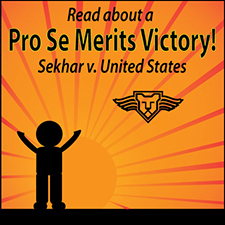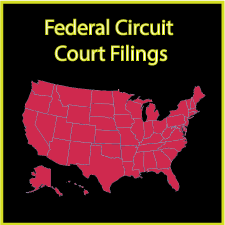Petition of the Month, March 2016 (Certiorari Granted): Mark Sheriff / Eric Jones et al. v. Pamela Gillie et al.
The Supreme Court Press “Petition of the Month”TM for March 2016 is Mark Sheriff / Eric Jones et al. v. Pamela Gillie et al., Supreme Court Dkt. No. 15-338, an appeal coming out of the Sixth Circuit. The case Mark Sheriff et al. v. Pamela Gillie et al. was granted certiorari, with oral argument scheduled for March 29, 2016. Eric Jones et al also filed a petition in this case, and appears as a Respondent in Support of Petitioners in Sheriff et al. at the Merits Stage. The Jones et al.petition and mertis brief was filed by attorney Boyd Gentry of the the Law Offices of Boyd W. Gentry.
Questions Presented:
This case asks whether Congress, through the Fair Debt Collection Practices Act, meant to interfere with the way in which a State engages in a sovereign function—its debt collection. Ohio requires its Attorney General to collect debts owed to the State. It authorizes the Attorney General to “appoint special counsel,” in addition to employees, “to represent the state in connection with” this debt collection. The law requires that the Attorney General give special counsel the office’s letterhead for use in collecting tax debts, and the Attorney General has read the law as giving him discretion over whether those counsel use that letterhead for other debts owed to the State. The Fair Debt Collection Practices Act bars “debt collectors” from “us[ing] any false, deceptive, or misleading representation or means,” 15 U.S.C. § 1692e, but expressly does not apply to “any officer or employee” of a “State to the extent that collecting or attempting to collect any debt is in the performance of his official duties,” id. § 1692a(6)(C). In this case, a divided Sixth Circuit held that special counsel do not qualify for this state exemption and that a jury could find their use of state letterhead “misleading.” The case presents two questions:
1. Are special counsel—lawyers appointed by the Attorney General to undertake his duty to collect debts owed to the State—state “officers” within the meaning of 15 U.S.C. § 1692a(6)(C)?
2. Is it materially misleading under 15 U.S.C. § 1692e for special counsel to use Attorney General letterhead to convey that they are collecting debts owed to the State on behalf of the Attorney General?


Thank you for discussing the Eric Jones and the Jones Law Firm v. Pamela Gillie and Hazel Meadows case with us. |
|
 |
You're welcome, and thank you for featuring this case. |
Tell us about your client. |
|
 |
Eric Jones is an attorney hired as special counsel to the Ohio Attorney General. He has served in that capacity since 2007. Ohio law authorizes the Ohio Attorney General to appoint special counsel to handle legal matters on behalf of the State. One of those matters is the collection of debts owed to the State. |
What are some examples of the debts which Eric Jones and his law firm would be collecting? |
|
 |
The debts could originate from tax liens, tuition for state universities, overpayment of state benefits, etc. |
The Jones law firm did not use its own letterhead to issue the dunning letters. Describe the stationery that was used and the authority for doing so. |
|
 |
For many years, the Ohio Attorneys General (both Republicans and Democrats) required Eric Jones to use the letterhead of the OAG Office when writing to debtors. His letters expressly identified him as outside counsel for OAG, since he was appointed to the office of special counsel. Ohio statutory law permits this use of the OAG’s letterhead. So, when Eric Jones wrote to the plaintiff in this case, he used the letterhead of the OAG and signed the letter as “outside counsel.” |

Although the public does not generally sympathize with attorneys, and much less so with debt collectors, it is easy to sympathize with Mr. Jones when he was served with a lawsuit with startling claims. Describe what happened. |
|
 |
You can imagine attorney Jones's surprise when he saw that he was being sued by a debtor solely for complying with the Mandate of the OAG. The complaint says that attorney Jones acted deceptively when he used the OAG letterhead because he was not an "employee" of the OAG office, and using the OAG letterhead allegedly gave the impression that attorney Jones was an employee of the OAG. Plaintiff argues that the use of the OAG’s letterhead gives a debtor the impression that the state was after them and would treat such debts with priority over private debts. Plaintiff seeks to represent a class of persons who received such letters from special counsel. Plaintiff’s claims are pled under the Federal Fair Debt Collection Practices Act, 15 U.S.C 1692. |
That seems a bit unlucky for Mr. Jones – to be sued for something that the Attorney General of the state had contracted him to do under the laws of Ohio. It also doesn’t seem overly misleading. |
|
 |
He does feel unlucky. Mr. Jones is only one of a number of attorneys who have been appointed as special counsel over the years. It seems odd to him that Richard Cordray, former OAG and current head of the federal CFPB, would have asked him to do something that would violate the FDCPA. |
You prevailed at the district court, with summary judgment being granted in favor of the defendants. What was the district court’s reasoning? |
|
 |
The district court found that attorney Jones was acting as an "officer" of the state of Ohio when he sent the letter, because he had been appointed as special counsel by the Ohio Attorney General pursuant to Ohio statute. Officers of a state are not covered by the FDCPA. The district court further held that the letter was not misleading or deceptive because attorney Jones was telling the truth: he was special counsel appointed by the OAG, and he was authorized, and indeed required, to use the letterhead. |
Mr. Jones suffered a reversal of fortune at the Sixth Circuit, and summary judgment was vacated with instructions that the jury should be submitted the question of whether the dunning letters were “actually confusing to the least sophisticated consumer.” How did they get to this opinion and what is a “least sophisticated consumer”? |
|
 |
The Sixth Circuit placed itself in the shoes of the hypothetical "least sophisticated consumer” and found, 2-1, that the use of the OAG’s letterhead could mislead a consumer into believing that the Attorney General’s Office was pursuing the debt. The “least sophisticated consumer” standard is not part of the FDCPA, but was created by the courts as a test to analyze whether a communication regulated by the FDCPA is deceptive or misleading. The Sixth Circuit latched onto the fact that attorney Jones was not an employee of the OAG: he is an independent contractor. If he had been paid as a W-2 employee, the Sixth Circuit would have affirmed (and the case likely never filed). Because of his status as an independent contractor, the Sixth Circuit opined that a jury should decide if the use of the OAG’s letterhead violated the FDCPA. |
That seems like a pretty low bar to squeeze under – the “least sophisticated consumer” – that seems like an unreasonable standard. |
|
 |
The least sophisticated consumer standard is squishy. I've been defending FDCPA cases east of the Mississippi since 2000, and it has been the focus of my practice for over a decade. The least sophisticated consumer standard gives judges a way to reach a desired conclusion, whether in favor of a consumer or a debt collector. The SCOTUS has a chance to change it here. |
Certiorari was granted in a sister case Mark Sheriff et al. v. Pamela Gillie et al. (No-15-338) This effectively grants certiorari to Eric Jones et al. v. Pamela Gillie et al. since Sheriff and Jones were joint appellants in the Sixth Circuit and Eric Jones has been granted leave to file a merits brief. Are you excited that this case is going to be heard by the Supreme Court? |
|
 |
Yes, i'm pumped. It is my first successful petition for certiorari. I've argued before the Supreme Court of Ohio twice, but this is the next level. |
Predictions. You’re going to win this case aren’t you? |
|
 |
We will win 5-3. This case seems to be made for Justice Kennedy on the federalism issue. |
 Supreme Court Press delivers on every promise. Quick turnarounds, competitive pricing, and most of all, quality. The editorial process was top-notch! The comments helped us refine our main talking points in both the petition for cert and the merit brief. Having an outside editor from Supreme Court Press made our arguments more effective for judges who don't deal with the FDCPA often - Boyd Gentry
Supreme Court Press delivers on every promise. Quick turnarounds, competitive pricing, and most of all, quality. The editorial process was top-notch! The comments helped us refine our main talking points in both the petition for cert and the merit brief. Having an outside editor from Supreme Court Press made our arguments more effective for judges who don't deal with the FDCPA often - Boyd GentryDo you have any parting thoughts on your experience working with the Supreme Court Press? |
|
Supreme Court Press delivers on every promise. Quick turnarounds, competitive pricing, and most of all, quality. The editorial process was top-notch! The comments helped us refine our main talking points in both the petition for cert and the merit brief. Having an outside editor from Supreme Court Press made our arguments more effective for judges who don't deal with the FDCPA often (this is only the third substantive FDCPA at the SCOTUS). |


---Bryan-Krumm.png)
---ZoeSpencer.png)


